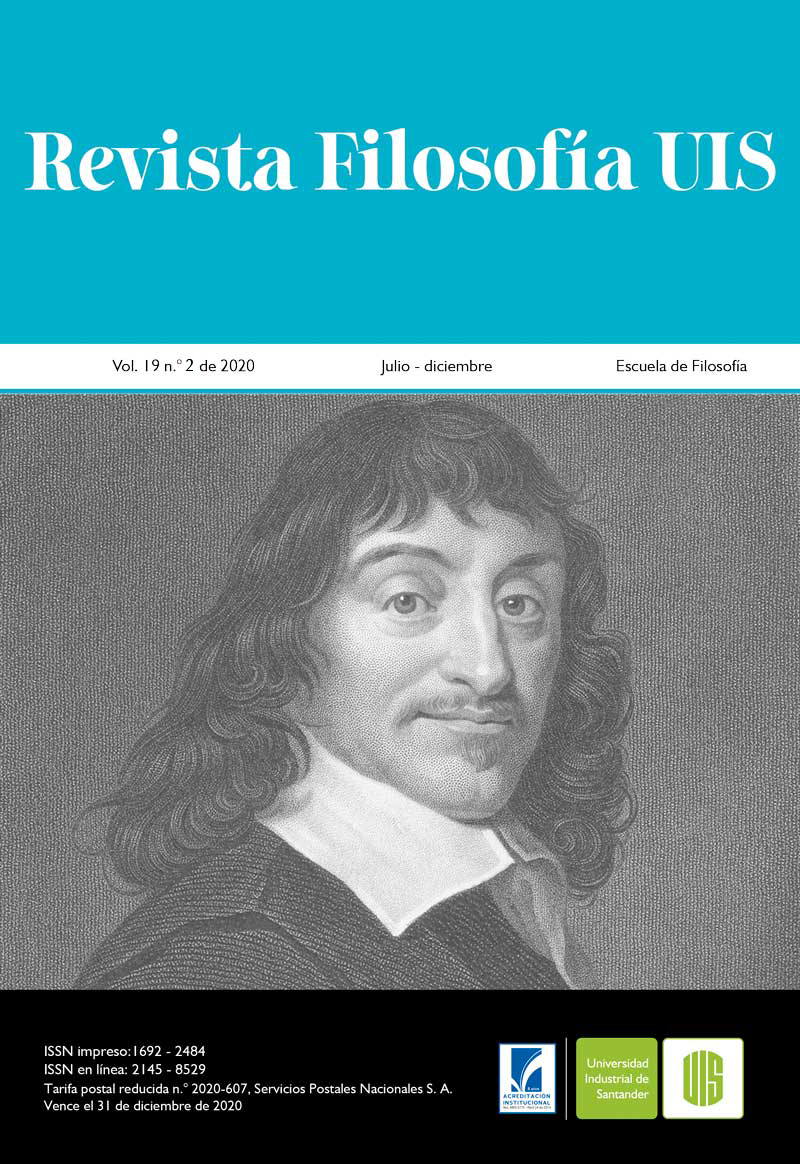The thinker under the mask. Aporias to the experimental philosophy
Published 2020-05-27
Keywords
- Nietzsche,
- Sommer,
- experimental philosophy,
- Zarathustra
How to Cite
Copyright (c) 2020 Revista Filosofía UIS

This work is licensed under a Creative Commons Attribution 4.0 International License.
Abstract
The Swiss thinker Andreas Urs Sommer is, undoubtedly, one of Nietzsche’s current specialists. In the year of 2017 publishes a text entitled Nietzsche und die Folgen, a book that recovers the figure of the German thinker in the light of quite novel ideas that until now had not been presented by most of the interpreters of Nietzsche. In that sense, the experimental philosophy (Experimentalphilosophie) presented by Sommer is the one that has caught the attention of critics. It would be a matter of hiding Nietzsche’s philosophy under the experimental game, thus omitting a certain type of commitment from his philosophical postulates. This determination is gaining strength insofar as it shows us the consequences of experimental philosophy. This work aims to develop, on the one hand, the central postulates of Sommer’s proposal and then confront them in the light of criticism and to what extent such criticism is central. The foregoing gives light of a discussion that more than leaning to the controversy shows the nutrient of a fruitful investigation.
Downloads
References
Botero, D. (2002). La voluntad de poder de Nietzsche. Unibiblos.
Choque, O. (2019). “Dios ha muerto” y la cuestión de la ciencia en Nietzsche. Estudios de Filosofía, 59, 139-166.
Choque, O. (2018a). El filósofo y su filosofía. La ‘filosofía experimental’ de Nietzsche. Fragmentos de filosofía, 16, 1-21.
Choque, O. (2018b). Ciencia y creatividad en Friedrich Nietzsche. Con-Sciencias sociales, 19, 20-31.
De Santiago Guervós, L. E. (Sin fecha). Sommer [Reseña]. www.uma.es/nietzscheseden/espanol/recensiones/SOMMER-14.pdf
D’Iorio, P. (Sin fecha). La edición crítica digital de las obras y la correspondencia de Nietzsche. www.uma.es/nietzsche-seden/obra/eKGWB.pdf
Fink, E. (2017). La filosofía de Nietzsche. Alianza Editorial.
Muller-Lauter, W. (1974). Nietzsches Lehre vom Willen zur Macht. Nietzsche-Studium, 3, 1-60.
Heidegger, M. (2013). Nietzsche. Ariel.
Marcuse, H. (2010). Eros y civilización. Ariel.
Morillas, J. (2019). Consideraciones acerca de la filosofía experimental de Friedrich Nietzsche. A propósito de la obra Nietzsche und die Folgen de Andreas Urs Sommer. Daimon, 76, 207-214. Http://doi.org/10.6018/daimon/325351
Nietzsche, F. (2002). Crepúsculo de los ídolos. O Cómo se filosofa con el Martillo. Alianza Editorial.
Nietzsche, F. (2007). La gaya ciencia. (A. Mardomingo, trad.). Edaf.
Schwab, P. (2015). “Critique of ‘the System’ and Experimental Philosophy – Nietzsche and Kierkegaard”. In K. Dawn Hay & L. R. dos Santos. (Eds.). Nietzsche, German Idealism and Its Critics (pp. 223-245). De Gruyter.
Sloterdijk, P. (2010). Temperamentos filosóficos. De Platón a Foucault. Siruela.
Sommer, A. U. (2006). «Dios ha muerto» y «¿Dionisio contra el crucificado?» Sobre la crítica de Nietzsche a la religión y al cristianismo. (L. E. De Santiago Guervós, trad.). Estudios Nietzsche, 6, 47-64.
Sommer, A. U. (2017a). Nietzsche und die Folgen. J. B. Metzler.
Sommer, A. U. (2017b). Nietzsche como placa giratória “na” modernidade? O Nietzsche de Heidegger nos Cadernos negros e o papel do filósofo. En E. Nasser e L. Rubira (org.). Nietzsche no século XXI (pp. 263-287). Editora Zouk.
Tongeren, P. V. (1999). Reinterpreting Modern Culture: An introduction to Nietzsche’s philosophy. West Lafayette.

